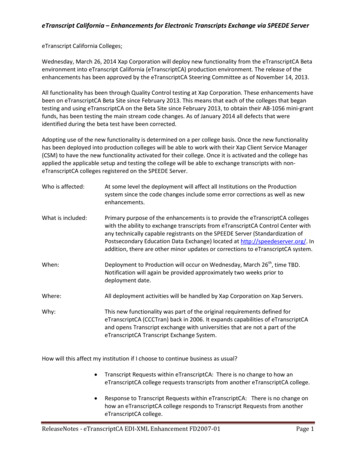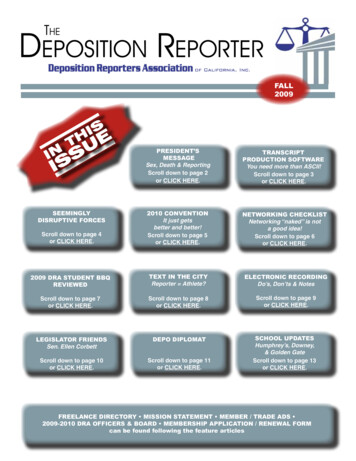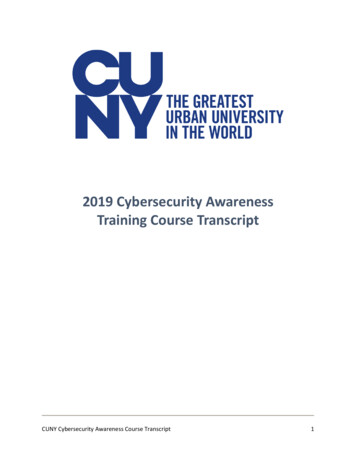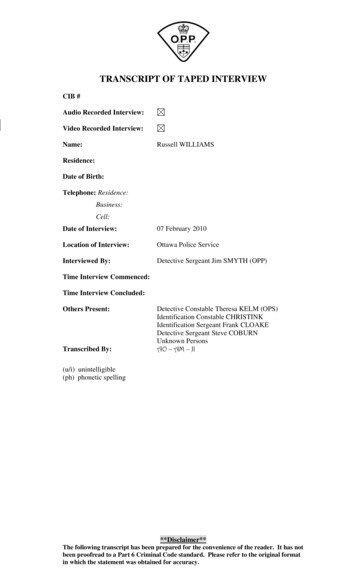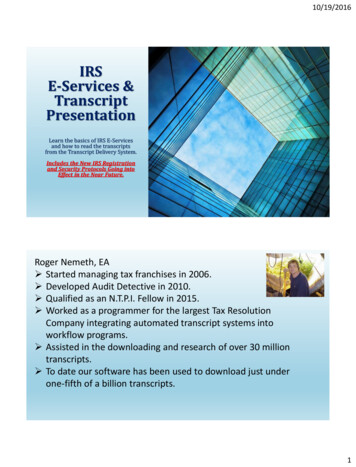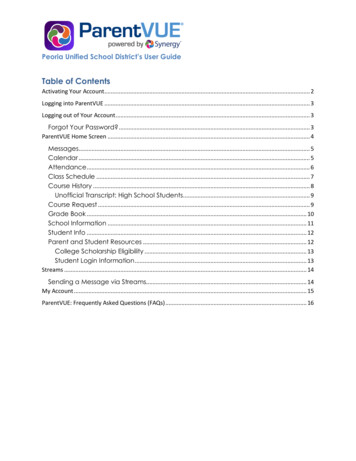
Transcription
The following is a transcript of a free podcast interview with Dan Poynter on selfpublishing and book marketing.Click here to access the free audio.The Creative Penn podcast has over 60 free audio interviewson writing, publishing options, internet marketing andpromotion for your book. It is aimed at authors, writers andpeople interested in books and publishing. You can see the fullbacklist of podcasts by clicking here.Click here for more resources on writing, publishing optionsand book marketing.You can also Click here to subscribe on iTunes.Hi, everyone. This is Joanna Penn from The Creative Penn,and today, I'm delighted to be interviewing Dan Poynter.Dan started his self-publishing career in 1969 as a one-mancompany with a book on parachuting and now has more thana hundred and twenty books in multiple languages publishedacross the world as well as staff, multiple products, and aninternational speaking career. His self-publishing manual isone of the key books that self-published used to navigatetheir journey. And Dan is a legend in the self-publishingcommunity. So, welcome, Dan.Dan Poynter with JoannaPenn at NationalSpeakers Conference,Gold Coast 2010DPoynter: Great to be here, Joanna.Joanna Penn: Fantastic to have you on this show. And I've been on Twitter this morningand people are excited to be listening to this podcast so wonderful. We'll get in to it.Dan Poynter: We'll, it's really fun. It's very international. You're in Australia. I'm inSingapore for few a days and we're able to get together because of Skype.Joanna Penn: I know. It's great. Okay. So, I'll just start by asking a basic question.Why did you start self publishing and why should people still self-publish today?Dan Poynter: Well, you have to appreciate this is pioneering. It was back in 1969 when Ifirst made that decision. And I was doing a very technical book on parachutes. I realizedhttp://www.TheCreativePenn.comPage 1
that no publisher would understand and certainly wouldn't know where to sell it. But Idid because I was selling to my friends in the parachute industry which is one of the basicsecrets.And so, I didn't even bother checking with the publisher and had no reason to facerejection and I went straight to a printer and started selling to people in my own industry.That is the secret to self-publishing. It isn't bookstores. It isn't the regular book trade. Itis selling – write what you know and sell to your friends. And my parachute books,for example, sell to parachute catalogues, parachute schools, parachute associations,parachute magazines who resell to their subscribers, parachute clubs and so on. This is amuch, much better market. That's the way to make money and self-publishing is theway to go.Joanna Penn: Brilliant. So, just I guess a follow up question on that, are you sayingthat really, only non-fiction authors should self-publish? Or what's your opinion onfiction authors?Dan Poynter: Well, the problem there is very simple. Most authors including the fictionauthors think that the only way to promote books is radio, TV and book signings andmost of us introverted writers don't want to go out and do those things. And so, they donothing at all but there are lots of ways to promote books. And, a lot of that is onlinenow as opposed to print and it's very easy. You can be discussing your favorite subjectwith people all over the world with whom your subject is also their favorite subject. Youcan do that almost anonymously.And so, the fiction authors don't usually promote their book. And that's why fiction is sohard to sell. Fiction would be much easier to sell if people did a couple of things.Number one would be to focus on a certain area; in other words, a geographic area wherelocal people and tourist would recognize the place names or a certain industry or a certainsport. I know a lady who wrote a work of fiction based on the skydiving industry and, ofcourse, all skydivers would want to read that and they are very easy to reach.We say you should work on your non-fiction first and save the fiction until you canafford it. But whatever you do, you have to promote the book. Publishers don't dothat.And so, if you're selling out to a publisher or publishing yourself, you still have to do thepromotion. You have to let people know that it exists. So, I just don't want to hearfiction authors say, "Well, I'm doing fiction so I know no one is going to buy it. So, I'mnot getting out there and telling anybody that I have a book."http://www.TheCreativePenn.comPage 2
Joanna Penn: Hmm. Now, good points there. One of the things that people say is thatthere is still a stigma of self-publishing. Do you think that has changed? And, doyou even care about that?Dan Poynter: I don't think there ever was a stigma. I think that some large publisherswere snobbish. Some people who have been published by a large publisher were maybesnobbish and said, "Oh, yes. Well, you couldn't find a publisher."Let me give you some numbers. In the United States alone, there are six very largepublishers in New York, Three to four hundred medium-sized publishers and 86,000 selfpublishers. It's the majority.In the United States, 78% of the titles are published by the self-publishers. The bigpublishers only do 22%. Now, think about it. Non-fiction, and I'll focus on that first –non-fiction is written and people buy it to learn something or solve a problem.And when somebody goes into a bookstore or other outlets, they look at these books onthe shelf and they're asking themselves, "Is this book going to answer my question?"They might look to see who the author is to see what experience you have in the industryand are you a credible person. Nobody ever looks to see who the publisher is, becauseit's hardly ever one of the large publishers. It just doesn't matter. People are notmaking buying decisions based on the publisher.Joanna Penn: Actually, that's a really good point. And, you know, probably we writersget too focused on the publishers. Actually, readers don't focus on the publishers. That isbasically what you are saying.Dan Poynter: Yes. That is perfectly true.Joanna Penn: So, talking about the new ways of publishing, then, because when youstarted it was just print books and you've recently published The Self-PublishingManual on Smashwords. And so, maybe you could tell us why you did that andwhat opportunities you see going forward.Dan Poynter: Well, everywhere we look we see that eyeballs are moving from print toonline. In the United States, for example, we see the newspapers are consolidating,downsizing, going out of business. I cancelled my subscription to the Wall StreetJournal, the only paper I've read for 45 years, because I'd pick it up and say, "I've alreadyread that online. That's not news. That's yesterday."And young people today get their news online and maybe from television. They're notreading newspapers. So, what's the future of the newspapers? Take a look at magazines.Advertisers have followed the eyeballs online and these magazines don't haveadvertising. And, they're going out of business.http://www.TheCreativePenn.comPage 3
Reed Publications, the people who put the Book Expo on America last month closeddown 27 magazines. One of them was Trade Show Week. And you take Newsweek, it'sbeen around for generations. It doesn't have any advertising. It's getting thinner andthinner. They're losing half a million dollars every week and they're up for sale. I can'timagine who would buy them.The future is online and the future is in E-books. We'll always have printed books butthe sale of printed books are pretty level and they're decreasing. The sale of E-books areskyrocketing. And both Sony and Amazon have brought people's attention to E-books.It's in the public consciousness. Many people got Kindle for Christmas. On ChristmasDay, Amazon sold more E-books than P-books, the printed books.And I have been reading E-books for years because I travel so much. I can't carry printedbooks with me. I don't have space. Now, I travel more than 9000 kilometers every week.And I spend a lot of time on airports, a lot of time in airplanes and I can't be carryingbooks around with me.So for years, I read on my Pocket PC. And for the last two years, I've read on my iPhone.The important thing for authors to remember is that they are generating content and thereare many ways to ring value out of their content or their work. Now, there are somepeople, Joanna, who would like to read your book but they can't. Well, they can read butthey're stuck behind a steering wheel. They're long-haul truckers or they're long distancecommuters or they're sales reps and they're in their cars all the time. If you're book isn'tavailable as an audio book, they can't consume it.So your book can be spun off into a printed book, an E-book, a large print book forthe visually impaired, the audio book, the iPhone app and so on. You're generatingcontent and there are lots of different ways to sell it.Now, you spoke about Smashwords? You can upload your text and cover toSmashwords and they will turn it into nine different formats – PDF, LIT, Moby PocketPalm, E/Palm, Sony, Kindle and so on – no charge. They put it up on their website. Andwhen they sell one, they send you 85%. They just keep 15%.Now, your audience is mostly in Australia and this is a way for you to approach the largemarkets and the U.S., UK and Canada and so on. Anybody can just go online, fill out thetwo-page form and upload the text and upload the cover and you're in. You're up there.Also, Smashwords has deals now with Apple, Google, Amazon and barnesandnoble.com.So, you have to give away a little more, then, that way. But your books, your E-book isnow available to all of these people. There was another announcement I read just thismorning that Amazon.com is now offering authors to upload their e-books 70%. Can youhttp://www.TheCreativePenn.comPage 4
imagine what that's going to do to the big publishers in New York who are giving you 10or 12% on the net receipts.So, I mean, it's absolutely amazing. So Google and Amazon and so on, they arebecoming the new publishers. The big publishers are going to go out of business.They're going to go from the top to bottom, overnight, just the way General Motors did.And the new publishers are going to be Amazon, Google, BarnesandNoble.com andApple. Those are going to be the new publishers.You see, what Amazon just announced is they say to authors, "Send us your text andwe'll put it up there and put it out as a Kindle book." They can also put it out as a printbook with their subsidiary grade space and we'll make it available to the entire world.And Amazon now is the publisher and the store and the manufacturer. They'redoing everything for you and they're giving you 70%.So you're going to see an awful lot of big name publishers going that route and they'regoing the abandon the state-old publishers in New York. The old publishers have notchanged their way of doing business since 1947. And they blamed everything on theeconomy and they're waiting for the economy to get better so they can go back tobusiness as usual. It isn't going to be there. The new publishers are the online people.The young people, the people who are doing things, the people who are making thedifference and we're all going to benefit from that.Joanna Penn: That's a fantastic outline of what's going on right now. So do you thinkright now is the very best time to be self-publishing and there's basically nothingstopping people.Dan Poynter: Oh, absolutely. Now, you could make more money. You can get the presssooner. You can keep control of the whole thing. It's just a wonderful time to selfpublish. You know, meanwhile, the big publishers are cutting back on their productionvalues. I ordered a book last year. It was a (Wiley) book I ordered from Amazon. WhenI received the book, I opened it up, and I put it down. They are cutting back on theirproduction values. The grade of the paper looks like newsprint. If you saw this book,you wouldn't read it because it has no credibility.And this is a fantastic opportunity for self-publishers today because your book is rightnext to these books from the large publishers and they're books look terrible and yours isdone on a nice white paper and looks great. And people are going to buy yours. I mean,you just have to see some of these books coming out there—absolutely awful.http://www.TheCreativePenn.comPage 5
Joanna Penn: Now, that's a really good point. I go on a lot about self-publishing becauseI love self-publishing, too, but what are the things that people fail at when they tryself-publishing? So what tips can you give us so we don't fail? Because, you know, alot of people do self-publish, but it doesn't get them anywhere.Dan Poynter: Well, every book has to go through four steps. Number one, it has to becreated. It has to be written. That's up to the author. Well, you could have a coauthor. You might even deal with a ghost writer. You don't have to be the writer to bethe author. The celebrity books aren't written by the celebrities. The celebrities are abrand. They have a following. They're going to sell so many books because they are acelebrity and they have a following and those are all done by ghost writers. We all knowthat.And the second thing you have to do is produce the book. That means, have it printedand have it bound. That's what a publisher does for you, but you don't need the publisher.You can go to a printer and have your book manufactured. The third thing is that yourbook needs to be distributed to bookstores and other outlets. And you make moremoney at the other outlets. That's what a book publisher does for you, but the bookpublisher only manufactures and distributes.And the fourth is the most important step, and that is the promotion. And that is upto the author. Publishers do not promote books. You ask anybody who's beenpublished by a publisher, they'll say, "Well, they manufactured the book and they sent itout to stores, but nothing happened. And then somebody told me I was supposed to dothem. I thought they were going to promote the book." Publishers do not promote books.They never have. They certainly don't now. And if you'll ask them, they'll say, "Well,we list your book in the catalogue." That's not book promotion.So then, by the time the author figures out that they're supposed to promote the book,nothing has happened. Nobody is interested in last year's book. It's too late. They haveto start over. They've lost a lot of time.So what often happens, because people don't understand what their responsibilities are, isthey write the book, they have it produced, they get it into distribution and then all of asudden they get distracted. It could be a family emergency or they start writing inanother book or they take up something else. They don't tell people they have a book.They haven't done any of the promotion.Now, I hate to use the word promotion because that turns a lot of people off. A lot ofpeople are introverted writers like me. We really don't like to do radio and TV and booksignings. And we kind of grit our teeth and go out there and do them, some don't go outthere and do them. And they think that that's the only way to promote books and that'swhy I have to tell the introverts, "Look, you don't have to do radio and TV. I giveyou permission not to. Here's what you have to do to promote your book. And ithttp://www.TheCreativePenn.comPage 6
can all be done online, from home. You don't get dressed. You don't go out of thehouse. It's all very easy to do."But the author still has to do the promotion. So the big failure is failing to do thepromotion, not letting people know that you have a book. And then these people comeback to you and me a year later saying, "Oh, this is a terrible industry. It's all stackedagainst me. I couldn't get anybody's attention." Well, nobody even knew that youexisted because you didn't tell them. That's the big mistake.Joanna Penn: That is brilliant. And you said something that I really thought was great.You mentioned there that you're an introverted writer. And I actually met you at theNational Speakers Conference a few months ago now and I was having this conversationwith other people. I said, "Look, I'm an introvert. I hate this stuff, you know, but I'mforcing myself." So maybe you could talk a bit more there about being an introvertand yet doing marketing and speaking and other things where you're almostperforming.Dan Poynter: Right. Okay. I want you to draw a line. And on that line, on one side, youput zero; in the middle, put five; and at the other – and put 10. Look at that line. And thefirst part, zero to five is introvert, five to 10 is extrovert. Now, figure out where you'regoing to be. This is really important that we understand ourselves because we're alldifferent and one is not better than the other.Now, up there very close to 10 is where you find the good sales people. Maybe at six toeight is where you find a lot of professional speakers, not all, but you do find a lot ofthem there. Around three and four and so on is where you find most of the writers. Anddown there, about one, is where you find most of the actors. Actors don't come out untilthey get into their character. A lot of these actors don't have a lot to say until they get ascript. And that's one of the reasons why many of them don't like to go out in publicbecause the last couple of encounters have not been very good since they were not asfascinating as their character, you know, they just didn't go over very well.So once you realized where you are, if you're down there in the zero to five range, thenI'd tell you, "You don't have to do radio and TV. There are other kinds of promotion thatyou can do." If you're up there, way up around nine or 10, these are the extrovertedpeople who need a couple of hours of social time in order to spend a few minutes alone.And, Joanna, you know, it takes more than a couple of minutes to write a book. And sofor those people, I give them permission to get help which could be an advanced editor ora ghost writer. You can be the author without being the writer.The important thing is to get your information down on paper and into a book sothat that book can be working for you and which brings you credibility, money andall that sort of thing. And, I mean, you know, in your business, as you run across thesevery, very extroverted people and they keep talking about this book that they're planninghttp://www.TheCreativePenn.comPage 7
to do and they never get around to it, and on the other hand, it's very hard to get a veryintroverted person to do any promotion and some of them don't show up for the TVappointments. Some of them don't show up for the autograph party. I mean, they're justscared to go out there.And so it's very important for people like you and me who advise the industry tounderstand who our clients are so that we can come up with the best plan for them andthen we can farm some things out. We can do some things for them. We can give thempermission not to do a few things. And that way, the book gets promoted. The author isa lot happier and it's more successful all the way around.Joanna Penn: That's great. I like that, giving permission to people to not be on radio andthings because I briefly did radio and TV and I just hated it but I love the internet. Itworks very well. So thank you for that. That helps.The other thing I wanted to ask about is your business model because clearly, you startedoff, you know, with just one book on parachuting and now, you've got all these books.You're an international speaker. You have staff. You have products. So could youcomment on how authors have to have multiple streams of income and what hasworked well for you?Dan Poynter: Well, first of all, write what you love and sell to your friends. I startedwith books on parachutes. That's my favorite subject. I could sit around and talk withother people about parachutes for hours and hours. And, you know, I was a parachutedesigner for a number of years. I'm a skydiver. I made over 1,200 jumps. I have all thelicenses and ratings. I'm past president of the Parachute Industry Association, pastchairman of the board in the U.S. Parachute Association. I was chief in delegation in1977 when the world meet was up there in Gatton, Queensland. I had a great time there.And, you know, sports has taken me all over the world and I've just made a whole bunchof friends. And so that's one of the secrets – is write what you know, write what youlove, and then sell into your own industry.The first step is to do more editions or more versions of your book. So you write thebook. You have it printed. You send off the files and you've got e-book. You sit downand record your audio book. You have the file all ready for the large print book. That'sfor the visually impaired and the reading-challenged. And so you can turn a lot of nonfiction books into an iPhone app. I have my own iPhone app. Go look up Dan Poynter atthe iPhone store and download it. It's free.So there are a lot of ways you can do that. Then in addition to that, what publishersshould do is get into other products. You see, as soon as your book comes out you'drealize, "Oh, people want to know more about this subject. They want to go into greaterhttp://www.TheCreativePenn.comPage 8
depth on that one." So you turn out special reports which ironically sell for more than thebook. I mean, you know, the book could be 15, but your report is 20 to 25.I've been selling special reports from my website since 1996. As far as I know, we werethe first one to sell downloads. Most of the people who are selling things online wereselling vitamins and running shoes and computer parts. And we were selling little onesand zeros.Let me tell you a story about an Australian. I get a call – it's been a few years now – andthis guy said, "Dan, I'd like this special report " whatever it was " how do I get that?"And I said, "Well, that's 19.95. We can ship it to you in what we call global prioritymail or envelopes and we can put one or two books in them. It takes about five days toget to you in Australia, maybe six. I don't know – oh, the shipping would be 11. I don'tknow if there'll be any taxes. There could be import duty. There could be sales taxes,(GST), something like that. But have you been to my website? You can go to thewebsite and you can download it for (four). It's a PDF. You can print it out yourself.There's no shipping charge. There are no taxes. There's no duty and you get it at thespeed of light."And he was like this, "Thank you, mate. I think I'll go to the website." That's what thebeauty is today, don't think locally. Think globally. You can sell your products allover the world. You can sell your e-books. You can sell your reports—everywhere.You have to do a promotion, and today, you promote online. That's where you post allyour information. Your information, your promotional stuff can be read by people insome other country. And they'll contact you.If somebody in South Africa orders your report or your e-book, you'll certainly not goingto say, "Gee, we haven't thought about that. We don't sell to South Africa. I mean, ofcourse, you're going to make that available. So you'll wind up selling one book here andone book there and one way over there. It doesn't matter what your subject matter is,there are people all over who are vitally focused on and interested in it.And so this is a great time to be in the publishing business. It's a great time to be incharge of your own publishing business. You want to be very close to your market. Andthese people, these friends of yours from all over the world are one of the places that yougather information, but they're also your clients. They are where you sell yourinformation. So it's a very good time to be in the publishing business. And you do wantto be totally involved in something you love.http://www.TheCreativePenn.comPage 9
Joanna Penn: Absolutely. Now, I do want to ask you again about speaking becausewe're almost out of time. But did you start speaking in order to sell some of yourbooks or did you start that as a parallel career almost and how is it worked for you?Dan Poynter: Well, I started with speaking on the subject about just over 20 years ago.And it was just another way to get the word out. We have to realize that our audiencesconsist of different kinds of people. Some people like writers and publishers are printoriented. They read. There are some people like sales people who are more auditory (orin a) general statement, they don't read, but they would listen to your e-book or your ereport. And there are some people who are very gregarious like speakers who like to goto conferences. They like to hear it from you and they like to mingle with each other.And so it's just a different, it's another spin-off. As I said, you could put your book outas a print book or e-book and audio book, but you can take that same information, turn itinto an iPhone app or you can turn it into a speech. And so there's just a lot of differentways to spin it off. And currently, I fly more than 9,000 kilometers. I go around (onlyspeaking). I joined the race. Right now, I'm on number 20. I spoke twice yesterday. Ispoke twice the day before. Here in Singapore, I'll be speaking an all-day Saturday andall-day Sunday. And then finally, first of the week, I get to fly home. A few days ago Ispoke in London twice and before that, Washington DC. So (if they are) really aroundthe world like (inaudible).So think about speaking, if you like to do it, if you don't like speaking, that's okay. I giveyou permission (not to).Joanna Penn: So, Dan, you have so much free information on your site. People canspend a lot of time there as well as books and resource. So can you tell people where tofind you online and how they can connect with you?Dan Poynter: The reason I have so much free information because my site has been builtand built and built since 1995 and it just keeps growing. And really, the reason so muchstuff up there free is to kind of to protect myself because I can't talk to everybody. Andthis way, it helps a lot of people and again, I just, you know, I can't do it one-on-one. Butanyway, yes. The most important thing is we have information kits. There's one onwriting, one on publishing, the one promoting. Each is about 20 pages long and they'refull of tips and resources that will get you squared away.And I suggest that people – to go to parapub.com. Think parachutes and publishing,parapub.com. And right at the top, there's a button that says something like resources,there's a dropdown menu, and you'll see free info kits. All you have to do is type in youremail address. We don't ask for your, you know, your special numbers or your mother'smaiden name or anything like that. We don't want to know your phone number. We justask your email address and then it comes back as a – with an autoresponder, you get ithttp://www.TheCreativePenn.comPage 10
just a few seconds. And you can print it out or read it online. So that's parapub.com.Get the free info kits.Joanna Penn: That's fantastic and I'll put all that in the show notes. So thank you ever somuch for your time, Dan. That was brilliant.Dan Poynter: Okay. Well, thank you so much.Thanks for listening today. I hope you found it helpful. You can get more informationon writing, publishing options, sales and promotion for your book atwww.TheCreativePenn.com. And you can also get your free ―How to Be an Author‖workbook hereYou can get a Free Author 2.0 Blueprint here which containsinformation on how to use Web 2.0 tools to write, publish,sell and promote your books.Also just released, multimedia short course ―Blogging forAuthors and Writers‖. Click here for all the information or tobuy for only 39.99.You can buy ―From Idea to Book‖ in various formats:PDF, Kindle and Print BookMore details and links a-to-book/You can buy ―From Book to Market‖ in various formats:PDF, Kindle and Print BookMore details and links k-to-market/http://www.TheCreativePenn.comPage 11
international speaking career. His self-publishing manual is one of the key books that self-published used to navigate their journey. And Dan is a legend in the self-publishing community. So, welcome, Dan. Dan Poynter with Joanna Penn at National Speakers Conference, Gold Coast 2010 DPoynter: Great to be here, Joanna.




